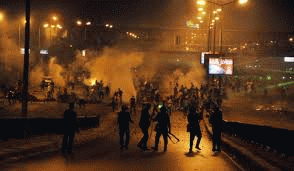For the time being, Turkey's Prime Minister Recep Tayyio Erdogan -- with the liberal use of brutal police tactics and massive amounts of tear gas that killed four people and injured more than 8,000 -- appears to have successfully crushed demonstrations aimed at blocking the demolition of Gezi Park in central Istanbul and has weathered a similar outbreak in the country's capital, Ankara.
But the upsurge was never just about preserving green space, and the picture conjured up by most the Western media -- secular Istanbul liberals vs. a popular Prime Minister backed by a conservative religious majority based in Turkey's Anatolian hinterlands -- was always an over simplification of the grievances behind the unrest.
Nor are those grievances the kind that are easily dispersed by clubs and gas, and the "popularity" of the Erdogan government may be shallower and more fragile than it appears. According to Turkey's MetroPOLL research center, Erdogan's popularity has dropped from 60.8 percent to 53.5 percent.
Certainly the demonstrations around Gezi Park reflect tensions between secular forces and Erdogan's Islamist Justice and Development Party (AKP). In the months leading up to the outbreak, the AKP-dominated parliament passed laws restricting the use of alcohol and tobacco, public kissing, and abortion, and the Prime Minister called on mothers to have three children. The Turkish daily Zaman found that 54.4 percent of the population "thought the government was interfering in their lifestyle."
While the demonstrations may have begun with secular youth in Istanbul, according to Kemel Dervis, former Turkish economic affairs minister, it is now a "social movement" embracing the whole country and includes "observant Muslims, mid-career professionals, factory workers and many others."
The unrest gripping Turkey has less to do with headscarves and Islam than with politics and economics, fueled by a growing discomfort with the AKP's policies of privatization, its push to centralize authority in the hands of the country's executive branch, and its silencing of the media. The three are not unrelated.
A case in point was the AKP's recent move to turn the authority of the Chamber of Engineers and Architects -- a group that opposed the commercial development of Gezi Park and challenged the government with a lawsuit -- over to the Ministry of Environment and Development, effectively sidelining the Chamber. Private developers close to the AKP were then handed the contract for razing the park and building a mall modeled after an Ottoman barracks.
Suppression of the media doesn't just involve tossing journalists in jail, although the government has jailed more journalists than Iran and China combined. It is also about a culture of mutual back scratching between media owners and the AKP.
According to Turkish journalist Yavuz Baydar, "Turkey's mainstream media is owned by "moguls who operate in other sections of the economy, like telecommunications, banking and construction," and that support for the AKP translates into lucrative "public works contracts, including huge urban construction projects in Istanbul."
For instance, the owners of the news channel NTV discontinued a popular publication (also called NTV), because it ran a cover story on the history of Gezi Park. NTV is owned by the Dogus Group, which recently won a $700 million government contract to develop Istanbul's old port for tourism, real estate and commercial shops.
Turning public lands over to private developers has long been a central plank in the AKP's approach to governance. In May 2011, the Erdogan government was granted the right to bypass parliament and make laws by decree for a period of six months. In August, the AKP dissolved the independent commissions overseeing the environment and "decreed" all such decisions now rested with the Ministry of Environment and Urban Development. According to Asli Igsiz, a professor of Middle East Studies at New York University, this meant that the environment was now at "the mercy of urban developers."
The Erdogan government is currently trying to pass a "Preservation of Nature and Biodiversity" bill that would dissolve independent watchdog commissions and hand all authority over national parks over to the Ministry of Forestry and Waterworks. If passed, the bill would essentially open 12,000 national parks, heritage sites and forests to "development, even the construction of nuclear and conventional power plants and factories," according to Igsiz.
The AKP's push for privatization is consistent with conservative, business-orientated platforms of the Muslim Brotherhood -- of which the Turkish party is a branch -- throughout the Middle East. In the year that the Brotherhood dominated the Egyptian government, it sold off state-owned industries at bargain basement prices, resulting in the widespread layoff of workers. Erdogan has done much the same thing, earning the ire of Turkey's trade union movement.
On June 17, the Confederation of Public Workers (KESK) and the Confederation of Progressive Trade Unions (DISK), representing 800,000 Turkish workers, struck to protest police brutality and demand the resignation of the government. "Freedom loving laborers who are striking a claim on their future" are taking to the streets throughout the country, a joint union statement read, to protest the "AKP, which has transformed [the] country into a hell by inserting its authoritarian practices."
The widespread participation of trade unionists in the Turkey demonstrations has largely been ignored by the Western press, which also failed to report similar support by Egyptian trade unions -- particularly those in textile and cotton -- for the overthrow of Hosni Mubarak and, more recently, Mohamad Morsi.
Erdogan is still popular in Turkey, but that popularity has thinned and largely rests on the AKP keeping the economy running smoothly and coming to some kind of agreement to end the long-running war with its Kurdish population.
(Note: You can view every article as one long page if you sign up as an Advocate Member, or higher).






